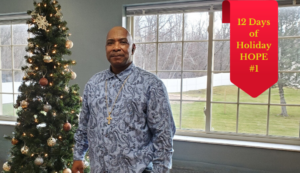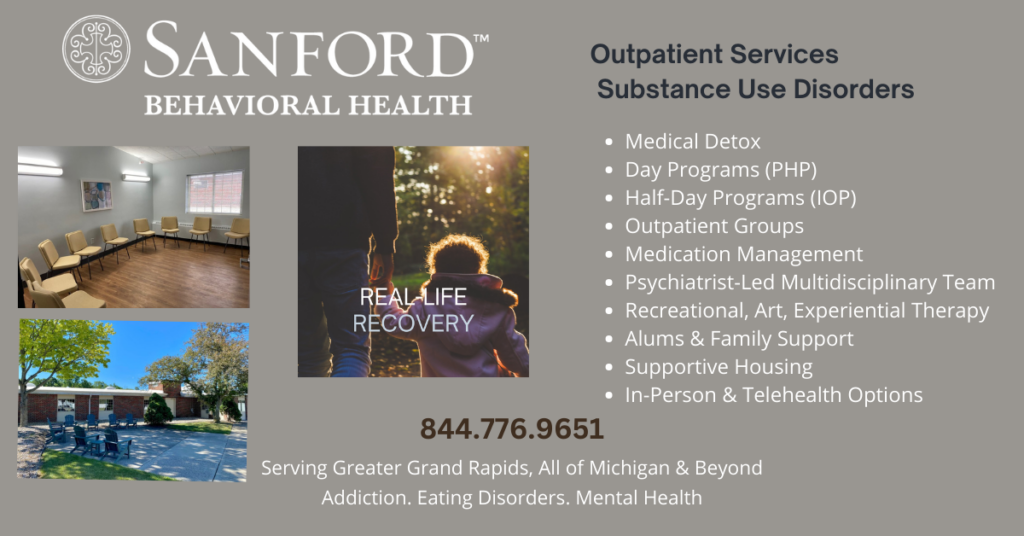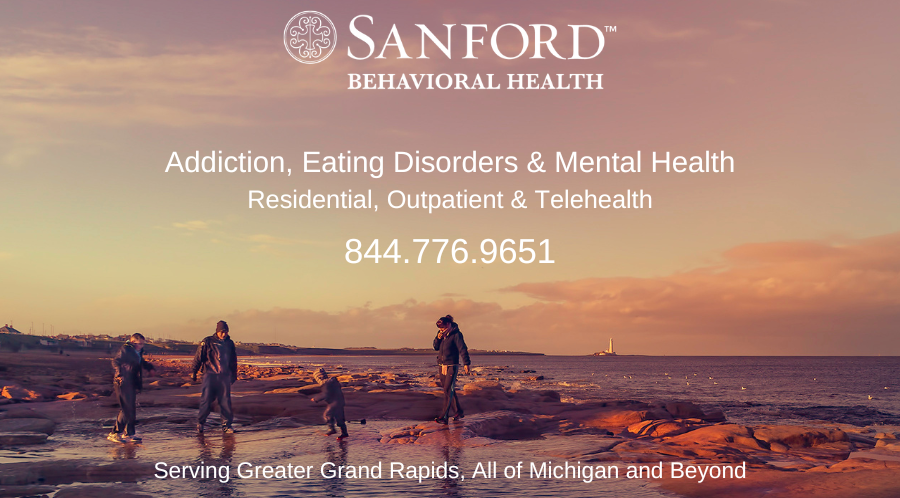12 Hopeful Ideas to Improve Your Mental Health 2024

Practice being a role model for your children – move for the joy of it!
During the holidays and beyond, we posted 12 articles with hopeful ideas to improve your mental health. We are heading into February with 2024 firmly under our belts. It seems like a good time to recap those 12 ideas while we still feel the newness of the New Year (and while our resolutions are still fresh in our minds). At Sanford Behavioral Health (Sanford), we are always looking for simple ways to make life’s journey a little less laden. The tips below will help to get you out of your head and into a healthier mindset.
1. Find a job that complements your values! (Or tell your recovery story.)
We interviewed self-styled “recovery minister” Rod Townes about his job at Sanford. As a Client Engagement Specialist, Rod says, “At Sanford, I get paid twice – financially and spiritually. Working in a treatment facility has given me a sense of purpose. My primary focus is helping people—my goal – to save as many people as I can from the disease of addiction.” According to SAMSHA (Substance Abuse and Mental Health Services Admin), connecting with others and sharing your story is helpful to those who may be struggling with mental health issues. Addressing addiction head-on the way Rod does shows Sanford’s clients (and everyone Rod comes in contact with) that they are not alone in their struggles and keeps him on track to boot. Now, those are hopeful ideas! [Read More]
2. Read about or listen to how other folks managed a challenge.
Hearing about someone else’s personal experience can be a powerful catalyst for change, especially in the recovery community. Group therapy is an essential part of mental health treatment at Sanford Behavioral Health because we are drawn to those who share a similar history. Knowing that someone else was once in your shoes (and is now on the other side) relieves the loneliness and sense of isolation and inspires hope. [Read More]
3. Make a change that sticks!
Accomplishing any behavioral change requires an understanding that change is a process and not a single event or goal. Sanford’s Family Program facilitator, Carli Noffsinger, LMSW, CAADC, gives her perspectives on how humans make behavioral changes like resolutions that last for years to come. [Read More]
4. Stop making excuses and get the help you need.
During the holidays (summer vacation, wedding season, a Wednesday), we get excuses as to why a person cannot go to rehab now, maybe later. At Sanford Behavioral Health, we understand that those with substance use disorders, eating disorders, and mental health conditions try to find reasons to put off getting treatment. Of course, the holidays present the ultimate excuse, but the best gift you can give any time of year is committing to the lifesaving help you need. We bust your justifications for waiting in the 4th article in the series. [Read More]
5. Find the activities, tools, and hacks that bolster your recovery and your mental health.
Whether it’s awe walks in the forest, sledding with the kids, or an escape plan from a family feast, we present a few of our favorite tools to put in your mental health toolbox, [Read More[
6. Pet a puppy or snuggle a cat – or find a treatment center with a therapy dog.
We like to sing the praises of the Sanford therapy dog, Appolonia. There are many benefits to having a dog like Apollonia at Sanford for patients and employees alike. Dogs aren’t capable of judgment the way humans are; they don’t know anything about the person they are interacting with. However, they are masters of reading emotions and body language – pet a puppy and experience the “good feels.” This article garnered almost 5,000 Facebook shares! [Read More]
7. Change the drinking “norms” and traditions at your get-togethers all year round (no hangovers or blackouts).
We provide 101 fun things to do that don’t involve alcohol and ten tips to change your and your loved ones’ relationship with alcohol. Now that’s hopeful and helpful! [Read More]
8. Be a role model for your children.
According to the National Eating Disorders Association (NEDA), “Starting at a young age, we begin to internalize messages that can lead to negative body image. Having a healthier body image is an important part of mental wellbeing and eating disorders prevention.” Between 23-35% of those with eating disorders (depending on the type of eating disorder) also have a substance use disorder, so early intervention is vital. Our article, with ideas for creating a safe environment for children, is a must-read. [Read More]
9. Find the right support for you. Pick up the phone and make a call!
We interview the Sanford admissions “dream team” (both guys are in recovery) on a day in the life at the other end of the phone. They share their recovery stories and how it helps to have “been there and done that” when speaking to potential clients. [Read More]
10. Get excited about the “trend” toward the dry or damp lifestyle.
The sober, curious, or “damp lifestyle” is the choice to be mindful and practice moderation when drinking alcohol. This includes avoiding binge drinking and overconsumption of alcoholic beverages. Interestingly, it is trending on social media. Get some great tips on cutting back or cutting out alcohol for a month or a lifetime. [Read More]
11. Look for hope and support from family, friends, 12-step meetings, and your Human Resources (HR) Department!
We interview HR Generalist Sam Domine on her long-term recovery and how it impacts her job in HR. She talks about being an advocate for others in recovery on the Sanford team. Sam says, “Those of us in recovery like to talk about our stories because it takes us a while to get here.” [Read More]
12. Sign up for outpatient treatment programs while living your real life.
Nearly one in five U.S. adults live with a mental illness while also living busy lives. At Sanford Behavioral Health, we are ready to address today’s busy lifestyles with flexible physical spaces and expanding outpatient and telehealth programs for substance use disorders (SUD), eating disorders, and co-occurring mental health treatment. [Read All About Real-Life Recovery]
If you or a loved one is struggling with addiction, eating disorders, or co-occurring mental health conditions, don’t wait to change your life – click the link below to speak with an admissions specialist today.
















